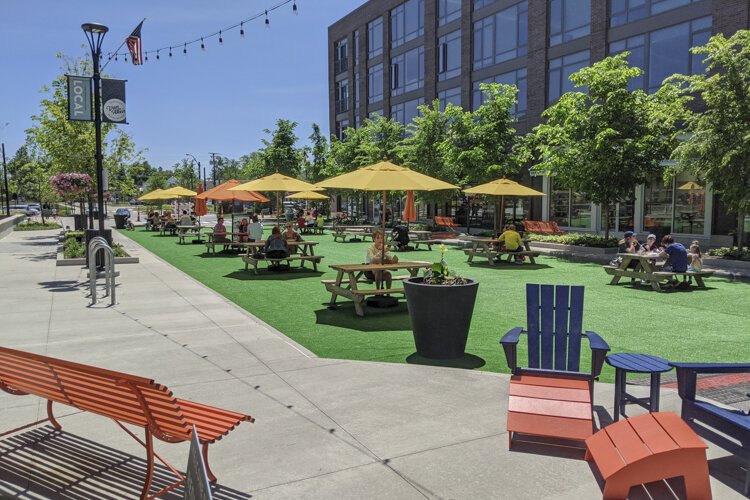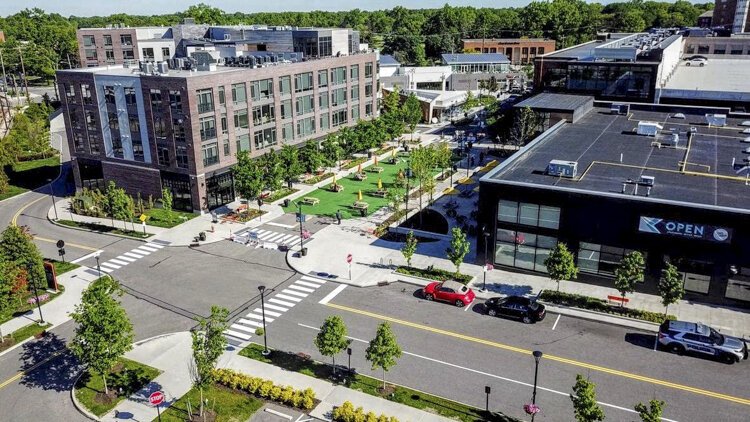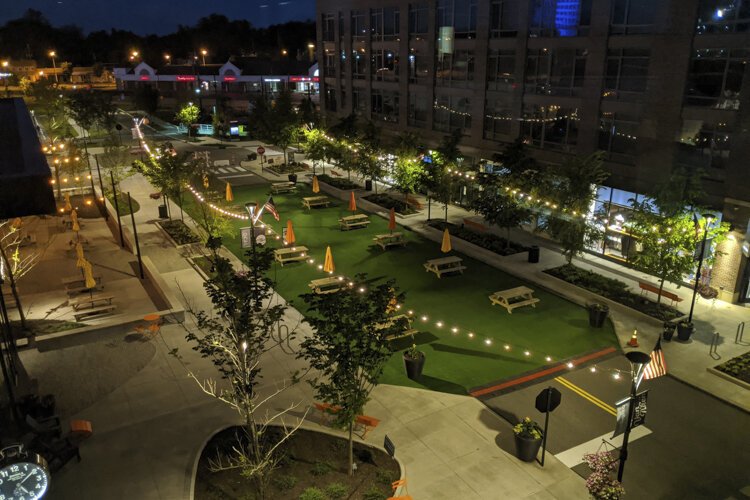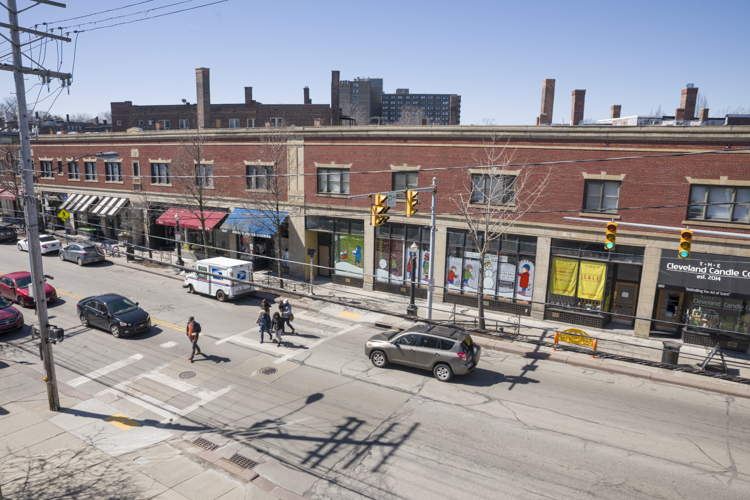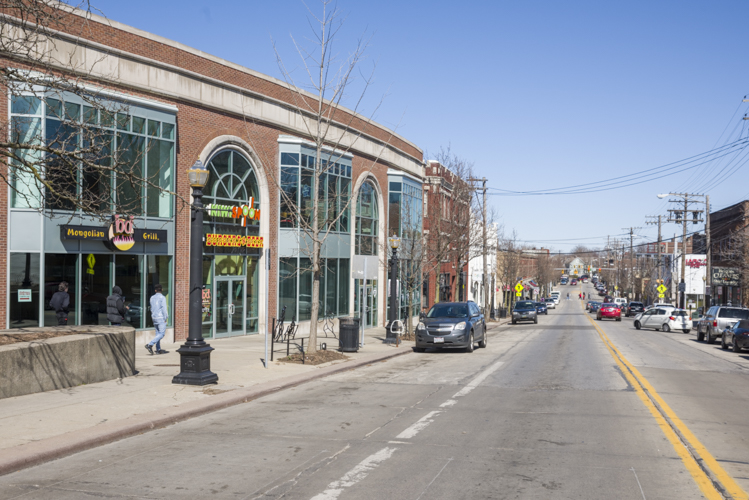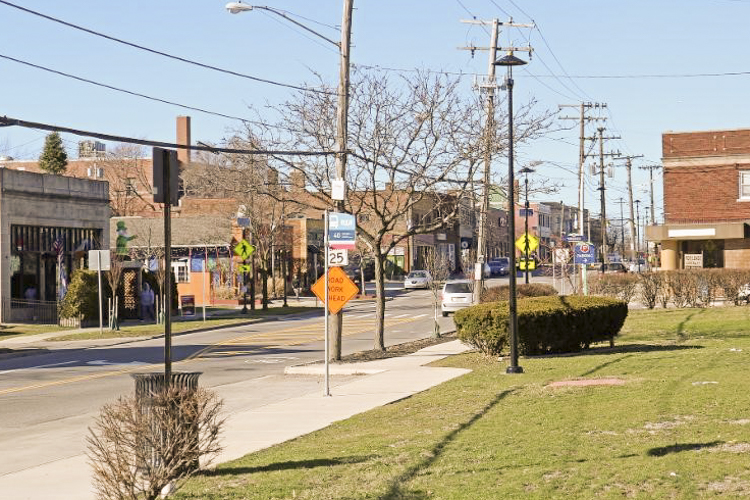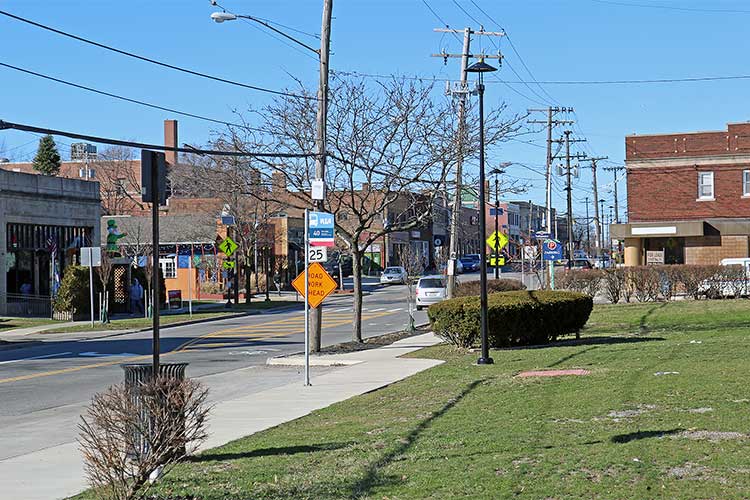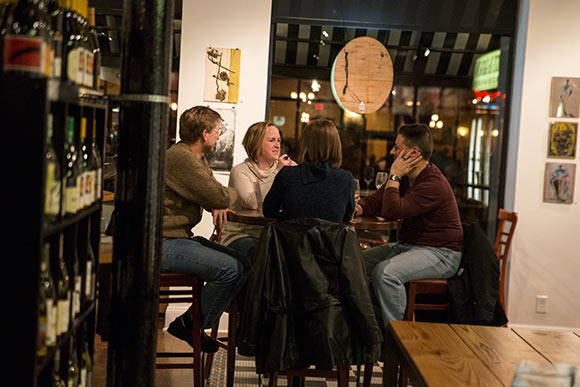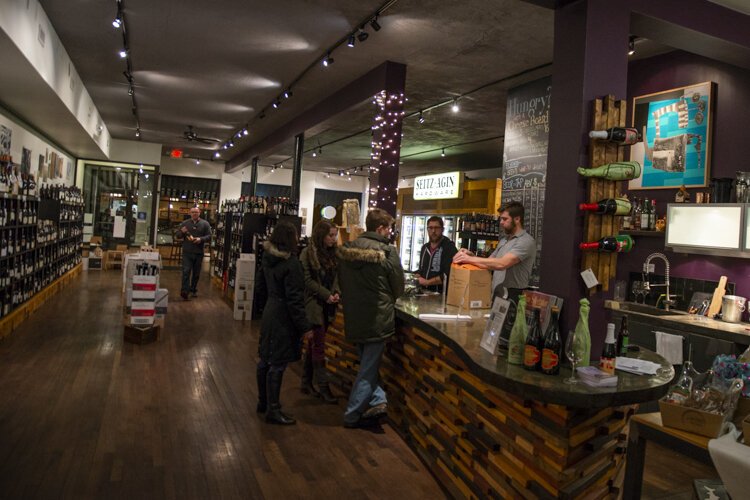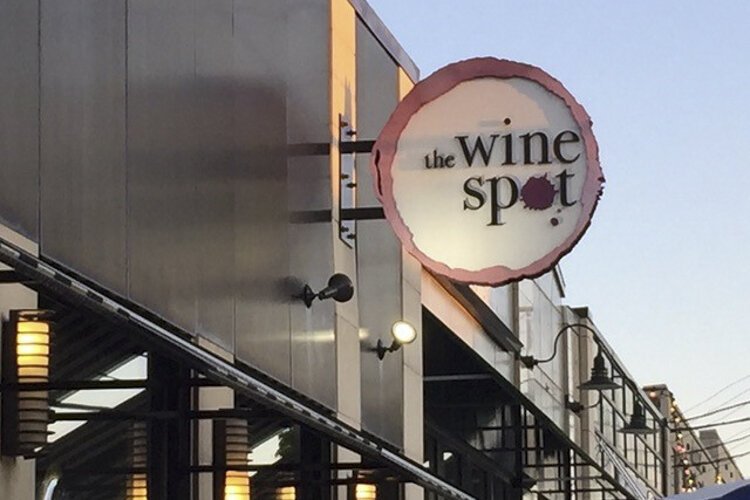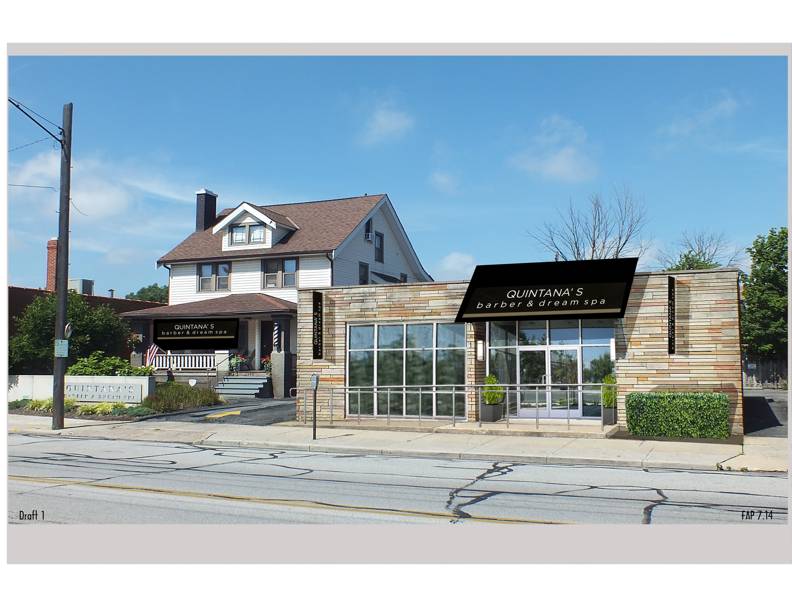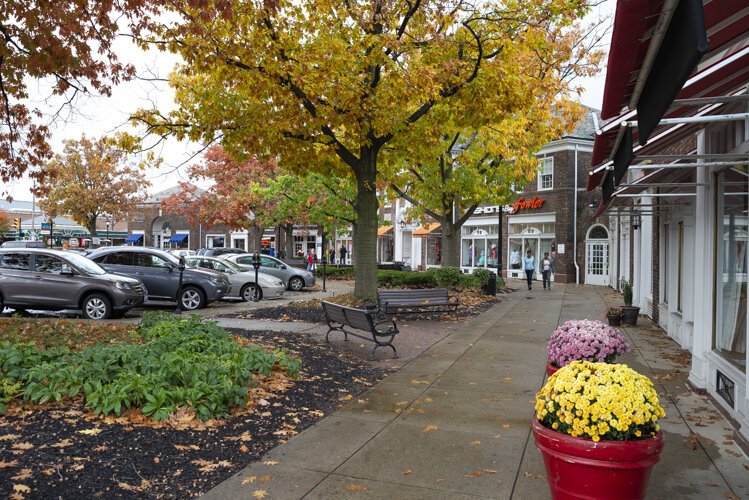Taking it to the street: Cleveland Heights considers loosening outdoor dining and entertainment laws
Shaker Heights: an alfresco success story
Shaker Heights recently closed Tuttle Road to car traffic in the Van Aken District and converted the street to an outdoor dining and entertainment district. Tuttle opened on Monday, June 1 with plenty of open space for socializing, eating, and drinking.
But Shaker’s director of planning Joyce Braverman and economic development director Laura Englehart say the city was at an advantage in that a license agreement was already in place with developer RMS Investment Corp. to use the right of way for outdoor purposes. “We already had the mechanism in place,” says Braverman.
The indoor-outdoor carpeting adds to the living room feel, says Braverman, while Englehart says the “outdoor refreshment area” allows visitors to stroll around while sipping on an alcoholic beverage.
“Our goal was to layout and expand an area where residents and District members can enjoy the District in a socially distant way,” explains Englehart. “And you can move around the entire outdoor refreshment area.”
Now that Ohio Governor Mike DeWine has allowed restaurants and bars to open during the coronavirus pandemic—if they follow mandated social distancing guidelines—many local establishments are struggling to find ways to accommodate customers with diminished seating capacities.
Some local cities, like Lakewood and Shaker Heights, have already implemented programs that allow restaurants and bars to expand into public spaces—like parking lots, right of ways, and sidewalks—as well as private driveways and land not ordinarily deemed service areas.
And after restaurant and bar owners along West 25th in Ohio City for years pushed Cleveland city officials to consider closing the street to traffic occasionally for socially distant dining and drinks. Yesterday, Wednesday, June 3, they got their way when Cleveland City Council agreed to let restaurants and bars use parking lots and some streets for dining and drinking.
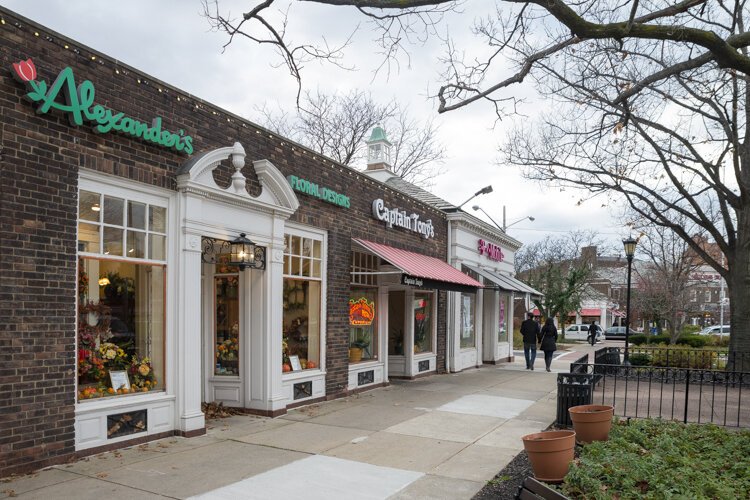 Now, Cleveland Heights is also considering a few ways to accommodate establishments throughout the city as well as in its three Special Improvement Districts (SID) in the city—Cedar Lee, Coventry, and Cedar Fairmount.
Now, Cleveland Heights is also considering a few ways to accommodate establishments throughout the city as well as in its three Special Improvement Districts (SID) in the city—Cedar Lee, Coventry, and Cedar Fairmount.
City officials have spent recent weeks talking to members of the Cleveland Heights business community, says Cleveland Heights business development manager Brian Anderson. “We’ve heard from 30 to 40 businesses in this process,” he says. It’s not a one-size-fits-all response, and some business are still trying to figure out what they are going to do.”
At the Cleveland Heights City Council meeting this past Monday, June 1, Cleveland Heights economic development director Tim Boland presented four initiatives that could help support city businesses during the COVID-19 pandemic.
The four initiatives are:
- Expand the current conditional use permits to allow for a temporary outdoor dining permit. The city’s current outdoor dining permits only cover private property. “Such a permit would expand outdoor dining to include the use of public property such as parking lots, public [right of way], and on-street parking areas,” Boland told council.
- Provide designated curbside pickup locations in strategic areas. “This would increase access to short term parking in close proximity to storefronts to allow for easy pickup and delivery and reduce vehicle parking [and vehicle] stacking issues,” Boland said.
- Close certain streets to vehicular traffic during certain days and times to serve as outdoor dining and expanded retail business activities.
- Use specific city-owned property, like the vacant lot on Meadowbrook or Coventry parking lot #15; and/or designate certain areas within a district as outdoor dining or refreshment stations, or even entertainment districts.
The details
Boland says they are still working out the details of the plan, and it will probably be at least a couple of weeks before anything is finalized.
“We think these initiatives are really important to work on, but equally important is to work through the details to have a positive impact on our businesses,” he says. But he also says that most of the proposed measures could be implemented immediately. Anderson stresses that the initiatives would apply to any Cleveland Heights business, not just businesses in the city's SIDS.
“I think the first three items above are ones I anticipate we can move most quickly on,” says Boland. “We plan to continue to work closely with our business community and SIDs to pursue the initiatives that make the most sense and can create the most positive impact in support of our businesses in as expedited a manner as possible.”
Anderson says new signage for short-term parking spaces—designated for curbside pickup and takeout orders—should be installed soon. “For the curbside zones, we’ve identified three to four spots in each of the districts—based on where the highest concentrations of businesses offering pickup and curbside are,” he explains, adding that some areas where takeout volume has been heavy, “choke points” and car stacking has become a problem.
 Both city officials and business owners are discussing the logistics of closing portions of streets like Coventry and Lee Roads in the commercial districts on certain days during certain hours, but the consensus right now is that it could be a good temporary place for this summer and fall.
Both city officials and business owners are discussing the logistics of closing portions of streets like Coventry and Lee Roads in the commercial districts on certain days during certain hours, but the consensus right now is that it could be a good temporary place for this summer and fall.
Boland says the fourth item—converting city-owned properties like the Meadowbrook site—could take longer to implement but could also serve as more long-term options for some districts.
Anderson says most of the initiatives required administrative changes, while the designated entertainment zones also require some legislative investigation.
Businesses support
Kathy Blackman, owner of the Grog Shop and B Side Lounge, 2795 Euclid Heights Blvd. at the top of Coventry, spearheaded a letter to Anderson, signed by 26 Cleveland Heights bar and restaurant owners, asking that the city consider some measures to ease the challenges Heights business owners are experiencing.
The letter lists four requests that would help the owners increase revenue at their establishments—ranging from expanding the conditional use permit for outside seating and expanding dining options on city-owned property and sidewalks, to closing Coventry and Lee Roads periodically for summer dining and drinking and creating entertainment districts.
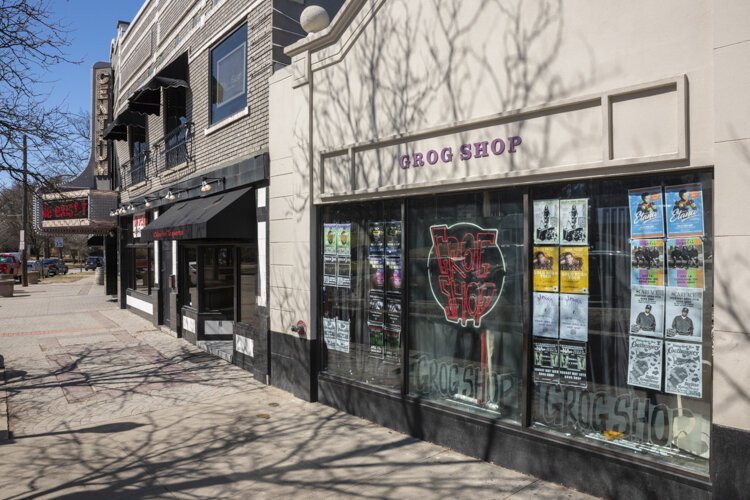 The Grog Shop on CoventryBlackman and other business owners say city officials have been open to their ideas and aware of the frustrations caused by some of the city’s regulations.
The Grog Shop on CoventryBlackman and other business owners say city officials have been open to their ideas and aware of the frustrations caused by some of the city’s regulations.
Both B Side and Grog Shop remain closed for now, and most Grog Shop shows have been postponed indefinitely or cancelled.
“Both of my clubs are extremely entertainment oriented—we’re a live music venue with [general admission] and no seating; we do mainly touring bands and everything has been canceled,” Blackman explains. “So, we’re not open and we have no plans to open.”
Blackman says she doesn’t really see a lot of options for her establishments, although B Side does have a small patio.
“The biggest thing for me, initially, is that they ease up on the conditional use permits,” she says. “So, businesses can expand into parking lots—and approve live music.” But she says she would also like to see the conditional use permit allow more than 25 in an outdoor area.
Blackman says ideally, she could open an area in the Coventry courtyard, located right outside the Grog Shop’s doors. “That would be fantastic if I could use that courtyard and work in conjunction with the Coventry Village SID.”
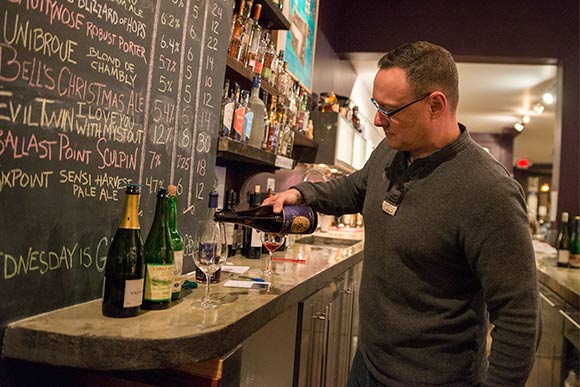 The Wine Spot owner Adam FleischerAdam and Susan Fleisher, who own the Wine Spot, 2271 Lee Road, Cleveland Heights signed the letter. The Wine Spot remained open for carryout and delivery during the restaurant shutdowns, but Fleisher says as some of these establishments re-open to full-service, the owners are not able to reach the volume of customers to make profits.
The Wine Spot owner Adam FleischerAdam and Susan Fleisher, who own the Wine Spot, 2271 Lee Road, Cleveland Heights signed the letter. The Wine Spot remained open for carryout and delivery during the restaurant shutdowns, but Fleisher says as some of these establishments re-open to full-service, the owners are not able to reach the volume of customers to make profits.
“What I’ve seen as some have opened back up, there are regulations we have to follow,” he explains. “So, you have half the capacity, and people aren’t coming out. This is not something that is going to go away any time soon. This is going to go on for three, six, 12 months. The things the city is considering are important.”
Fleisher says he personally would like the city to close Lee Road, or a portion of Lee Road. “For me, closing off Lee Road three nights a week, for three or four hours [is a good idea],” he argues. “I think what people want is that social distance. Yes, we’re craving social interaction, but we want space.”
Fleisher envisions a plan where Lee is closed between Silsby and Meadowbrook, or between Cedar and Meadowbrook—which he says still makes it possible for cars to navigate around the closed street.
He does stress that the parking lots, at least for the most part, would have to remain open so the retailers would still be accessible as well.
“The key is making sure any business that wants to take part can take part,” Fleisher says. “I like the fact they’re looking at multiple things.”
Fleisher adds that he thinks Cleveland Heights officials are doing a good job of weighing the options. “I have to give the city of Cleveland Heights a lot of credit for taking this on and looking at multiple ways of trying to support small business survival,” he says. “And I’m thinking they’re doing things as quickly as they can.”
“Businesses need it right now,” Fleisher says. “We have to do something. These are thinking outside the box opportunities.
Quintana’s Barber and Dream Spa, 2200 and 2190 South Taylor Road, opened earlier this week but owners Alex and Dawn Quintana are yet to open the Speakeasy above the barber shop. Alex says they plan to start serving cocktails on Wednesday, July 1, provided they can serve drinks outside.
“We have to have a specific scenario,” says Alex Quintana. “If and when it’s possible to use our outdoor areas for drinks and dining opportunities on the sidewalk.”
He says operating at limited capacity inside the intimate speakeasy just isn’t an option. And although Quintana’s sits on a private lot, the current conditional permit limits seating to less than 25 people, and Quintana says he would still have to get a liquor permit to serve outside.
“We would do it in accordance with regulations,” promises Quintana. “We’re just trying to find a way to survive with 25% or 30% occupancy.
Quintana says he would love it if the city would open the Cedar-Lee parking lot for outside dining. In the meantime, he says he is not sure how the speakeasy will survive while COVID-19 is still around.
“If, with every day that ticks by things get better and not worse, we’ll see about trying to start reopening,” he says. “If we can’t make it work, we have to look at different options. Maybe we won’t come back.”


